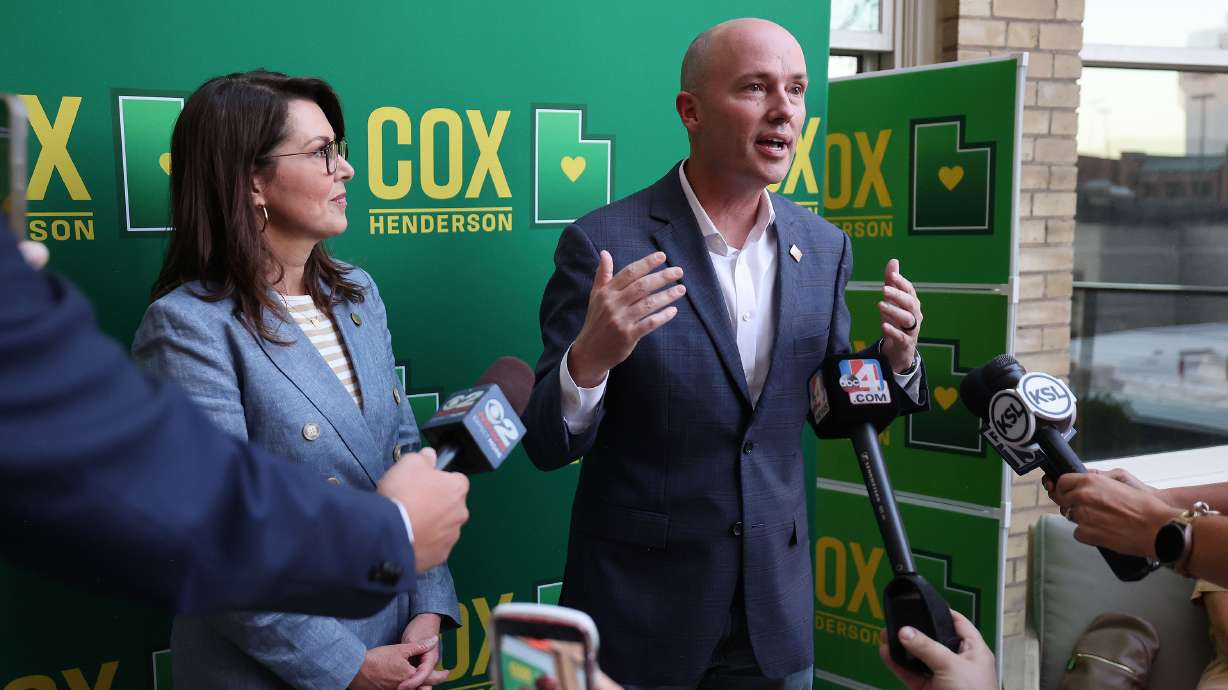Estimated read time: 3-4 minutes
This archived news story is available only for your personal, non-commercial use. Information in the story may be outdated or superseded by additional information. Reading or replaying the story in its archived form does not constitute a republication of the story.
SALT LAKE CITY — Utah Auditor John Dougall said it's "statistically likely" three Republican candidates gathered enough signatures to qualify for the June primary ballot after sampling random sets of ballot petition signatures.
Dougall's statement Tuesday comes after weeks of questions by losing Republican gubernatorial candidate Phil Lyman, who repeatedly questioned the validity of the signatures used to qualify Gov. Spencer Cox for the ballot. The auditor's office examined a sample of signatures collected by Cox's reelection campaign, along with the Senate campaign of Rep. John Curtis and attorney general candidate Derek Brown — both of whom won their respective primaries after collecting signatures.
"Given the concerns expressed by some over the inability to review the names of voters with protected voter registration information who had signed candidates' packets, we concentrated our work specifically reviewing a sample of those signatures," Dougall said. "We concluded that it is statistically likely each of these candidates met the statutory threshold of required valid signatures. In addition, each candidate had ample time before the deadline to gather additional signatures, if requested by the signature validators."
Utah statute provides dual paths to the primary ballot. Candidates can either collect a certain number of signatures — based on a percentage of the number of registered voters in their district — or they can advance by winning at least 40% of the vote from some 4,000 party delegates during the nominating convention.
Republican delegates make up less than half a percent of the more than 900,000 active GOP voters in the state and are not broadly representative of the Republican electorate. Convention winners often underperform in primary elections and many delegates and some elected officials have complained about the law creating the signature-gathering path.
Lyman, a Republican state representative from Blanding who defeated Cox during the convention, began questioning the validity of Cox's signatures after the incumbent was projected to win shortly after the polls closed on June 25. His campaign in July asked the courts to force officials to turn over a list of names of people who signed ballot petitions for Cox, but his request for emergency relief was rebuffed last month by the Utah Supreme Court.
In response to questions about the legitimacy of signatures gathered on behalf of Cox and other candidates and after the governor himself asked for an audit of Davis County's processing of signatures, Dougall announced on Aug. 20 that his office would conduct a "limited review" of the state's election procedures, including the signature gathering.
Dougall's announcement Tuesday was based on "initial observations" of the situation, and the auditor said his office continues to examine "other aspects of Utah's election process." He said he hopes the initial information will "provide the electorate with greater insight into the recent signature validation process."
He detailed his office's efforts in a letter, which states that auditors examined 373 of Cox's signatures, along with 372 from both Curtis and Brown. Those sample sizes were based on the number of signees for each candidate who asked that their information be kept private which were "therefore, less subject to review by interested outside parties," the letter states.
Each candidate submitted at least 31,000 signatures, more than the 28,000 required by state law for statewide races. Auditors sampled some 128 signatures that were not counted — election officials stop counting once a candidate meets the threshold of verified signatures — and found no issues with those sampled.
The auditors found 12 signatures they believed did not substantially match with signatures on file.
"While this letter notes exceptions, this should not negatively reflect on the quality of work performed by Davis County Clerk's Office," the letter states, referencing the county that completed the verification. "Rather, the low exception rate indicates that they performed their validation duties with care and professionalism."










